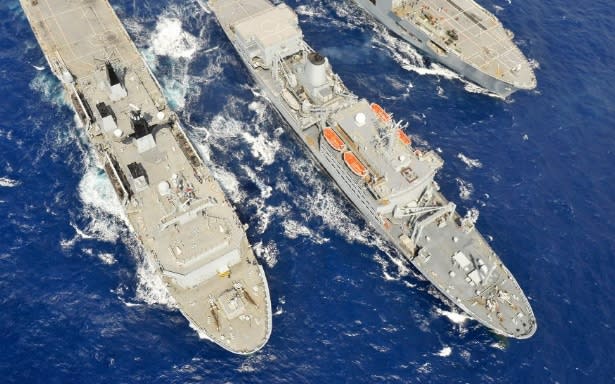MoD accused of abandoning British shipyards in £1.5bn Navy contract

The Ministry of Defence has been accused of abandoning Britain’s shipyards as a £1.5bn battle to build Royal Navy supply vessels intensifies.
Several foreign firms are being considered to build a new generation of ships which will supply the Navy's aircraft carriers, according to details published on Wednesday.
It prompted a backlash from trade union officials who said the Government risks squandering a chance to reinvigorate the UK shipbuilding industry.
The so-called “Fleet Solid Support” (FSS) vessels will provide the Navy’s aircraft carriers with equipment, ammunition and food so they can stay at sea for extended periods.
Experts had hoped work on the ships would go to British yards, helping to end a cycle of boom and bust.
But Ben Wallace, the Defence Secretary, has now announced that four consortia have been awarded £5m contracts to develop their bids for the FSS ships - and they include businesses based in India and the Netherlands.
Industry veteran Sir John Parker produced a national strategy in 2017 which recommended a “steady drumbeat” of orders divided up between yards to keep them operating.
Ian Waddell, general secretary of the Confederation of Shipbuilding and Engineering Unions, said: “Sir John Parker was very clear when he recommended in the national shipbuilding strategy that a UK-only competition should be considered for defence-funded vessels.
“Given that the Defence Secretary has categorised FSS as a warship it is unclear why overseas involvement continues to be encouraged in this programme. It is vital that the Government gets a grip and builds these ships in Britain.”
The MoD did not give full details of the make-up of the consortia, providing only their leading members or group names, and the involvement of British firms.
Winners of the contracts were:
Larsen & Toubro, an Indian-based conglomerate with a shipbuilding arm, working with Leidos Innovations, a UK-based IT business;
Netherlands-based shipbuilder Damen and Serco, the UK-listed outsourcer, which has contracts supporting the Royal Navy;
Team UK, whose leading members include British defence heavyweights Babcock and BAE Systems which have extensive domestic shipbuilding facilities;
Team Resolute, which includes British marine engineer and Belfast shipyard Harland & Wolff. Team Resolute has previously announced it also includes Spanish state-owned shipbuilding giant Navantia, though this was not originally mentioned by the MoD.
Revealing the contracts, Mr Wallace said he was "proud to see UK companies stepping up to the challenge of the FSS as we begin the next chapter of this British shipbuilding success story”.
He vowed that the contract will “deliver ships essential for the UK's security as well as vital jobs and skills". However, the MoD has refused to say how much of the work it will require to be carried out in the UK.

Defence chiefs have previously said only that a significant proportion would have to be done domestically.
On Wednesday, the MoD added: “It is too early to confirm details of the build programme, including workshare arrangements. They will be agreed with industry as an outcome of the competition.
“A requirement for a significant proportion of the work to take place in the UK, including that the ships must be integrated in a UK shipyard.”

 Yahoo Finance
Yahoo Finance 